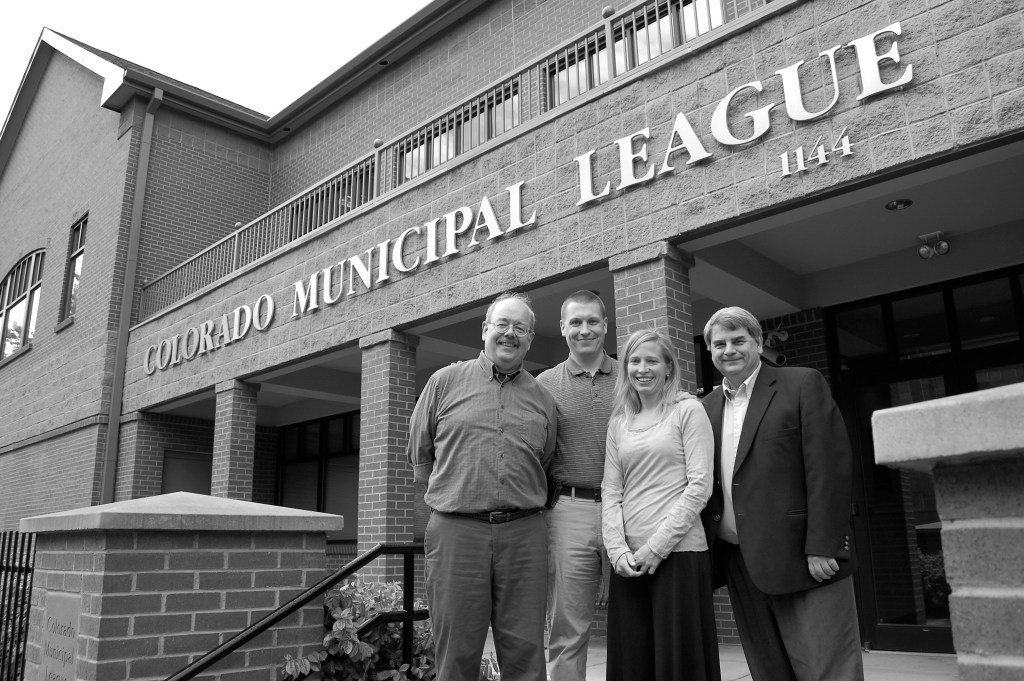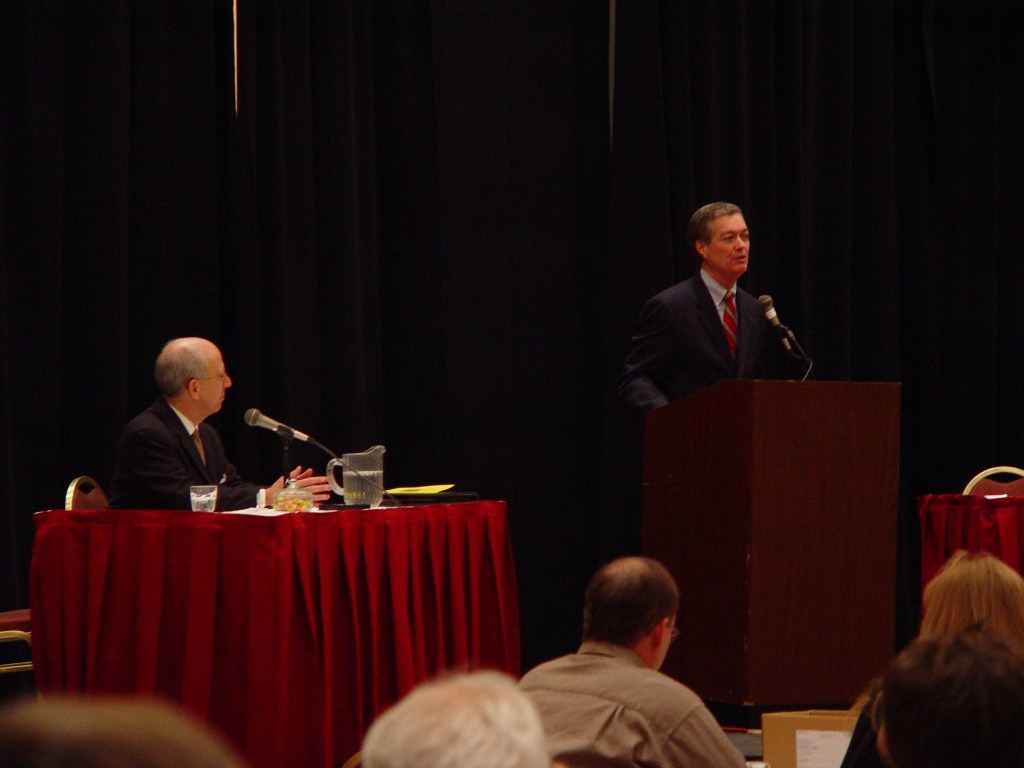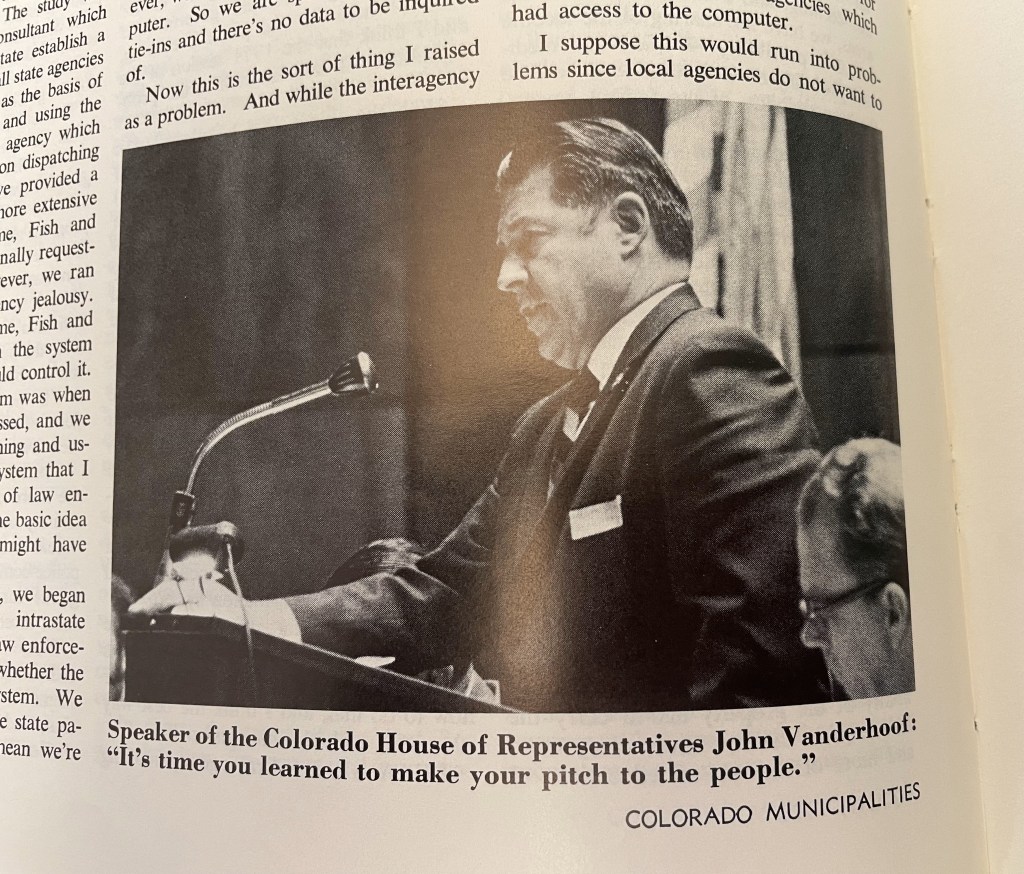The Advocate
This is the third story in a series of eight, celebrating the Colorado Municipal League’s dedication to serving Colorado’s municipalities over the last century.
In 1923, the Colorado Municipal League was formed with three founding principles in mind—advocacy, information, and collaboration.
While researching other state municipal leagues in preparation for the formation of Colorado’s, the University of Colorado’s Bureau of Business and Governmental Research’s Don C. Sowers determined that each league served as an advocate at the state level. Since then, the League has been a fierce advocate on behalf of Colorado’s cities and towns in the Colorado statehouse, with state agencies, and at the federal level.
The objects of the Leagues are to study the needs of the cities and to promote the application of the best methods in all branches of municipal service; to secure legislation which will promote the interest of cities and oppose legislation which is deemed injurious…
Don C. Sowers, First Annual Convention Proceedings
While suits and faces may have changed between 1923 and now, the issues have stayed consistent over the century, evolving with our growing state’s needs and bending only slightly with the changing times.
Making Waves in the State’s Water Discussions
Some of the big issues being discussed during the 24th Session of the Colorado General Assembly informed many of the policies we see today. In 1923, legislators were discussing some of Colorado’s largest issues, including water—specifically the Colorado River Compact.
In 1923, the Colorado General Assembly approved the Colorado River Compact, which determined how the water from the Colorado River would be allocated between the Colorado River Basin states. This decision helped inform important water policy, growth, and development well into Colorado’s statehood.
While the League may not have been directly involved in the initial Colorado River Compact discussion, it would become involved in important water-focused discussions in the near future.
In 1927, Colorado Municipalities provided a legislative update to members that included a bill concerning municipal water use. As the legislation took shape, League representatives were present to ensure municipal interests were advocated for.
Senate Bills Nos. 2, 3, and 4, introduced by Senator Bogden, Denver outlines the procedure to be followed by towns and cities in initiating appropriation of water; authorizes cities to lease surplus water not needed for immediate use…Members of the League’s legislative committee were also present and urged the importance of these bills to the future growth of the cities.
Colorado Municipalities 1927
Advocating on behalf of municipal interests when it came to water did not stop in the League’s first decade. In 2005, the Legislature formed the Colorado Basin Roundtable (CBRT) with support from CML. Consisting of stakeholders and water managers, CBRT brought together diverse interests from across Colorado to meet the state’s water-related needs and find new ways to approach water conversations ranging from conservation to supplies. CBRT still exists and was the foundation for the Colorado Water Plan, which continues working to solve Colorado’s water challenges.
The League was instrumental in ensuring not only that the Roundtable was formed, but successfully advocated for municipalities to be represented, helping shape the state’s discussions about water.
The stakeholders of the Colorado River Basin respect the State’s effort to govern water planning for the benefit of all residents; however, there is a strong recognition of the vast diversity in the needs and desires of all regional management entities and the value of local control. Moving forward the planning horizon for land use and water supply should extend beyond 2050, working towards meeting our goal to protect and restore our environmental, agricultural and recreational settings through the use of high conservation and water efficiency practices.
Colorado Basin Roundtable
Keeping Conservation Consistent
Conservation, while in a different context in 1923, was also a major issue during the Session taking place in the League’s first year. The General Assembly extended Colorado’s existing wildlife protection legislation, adding regulation to game hunting.
Over the course of its lifetime, the League has come to the table for several discussions focused on conservation. In addition to helping ensure CBRT was formed, the League played a critical role in establishing the Colorado Lottery.

The Colorado Lottery, which is celebrating its 40th anniversary in 2023, has “given $4 billion back to preserve and protect Colorado’s parks, trails, and open spaces,” according to its website. Much of the funds generated through the lottery return directly to Colorado’s municipalities, benefiting their local economies, tourism, and quality of life. From East to West and North to South, the Lottery’s projects span the state.
While it might seem like a no-brainer today, establishing the Lottery and ensuring it benefited local governments required advocacy at the ballot box, then in the Legislature. The League worked tirelessly to get the Lottery approved on the ballot, then passed through the Legislature. Stay tuned for more about the Lottery in our upcoming “Powerful Partnerships” story.
Local Control—A Guiding Light
Since its beginning, the League has been a staunch advocate for local control and home rule. Ensuring municipalities had a seat at the table in the CBRT discussions and benefited from the Lottery is just the beginning. The League served as a resource to municipalities interested in becoming home rule, advocated on behalf of local control in the legislature, and served as an advocate in the courts.
In one of its first publications, Colorado Municipalities published an article titled “How to Secure a Home Rule Charter in Colorado.” This article outlined the history of home rule, and procedural guidance for cities interested in pursuing a home rule charter.
Within its first year, Colorado Municipalities argued that a public utilities amendment the legislature was considering would “deprive cities of certain powers of local self-government.” (Oct. 1926 Colorado Municipalities)

These are just a few examples of the early home rule and local control discussions the League led. Between then and now, with the 105th home rule municipality being established in November 2022, the League has served as a supporter and advocate of Colorado’s home rule municipalities.
While the League’s legislative efforts may seem to span diverse topics, one guiding theme remains the same—success relies on the voice of Colorado’s municipalities. When water, taxes, or housing become subjects of legislative scrutiny, CML ensures municipalities’ voices from across the state are heard, and their interests are represented.
Continue reading about CML’s involvement in Colorado’s home rule discussion in our second installment in this series.
Housing Affordability and Accessibility
Housing has been, and continues to be, top of mind for municipalities across the state. The League’s State of Our Cities and Towns Survey has seen housing as a key municipal concern for years.
Housing is not a new topic of conversation among Colorado’s municipal leaders. Several of the League’s early conference programs included sessions about housing. However, as our state has grown and become more dense, housing challenges have evolved.
The present legislative session is a great example of the League’s advocacy on behalf of Colorado’s municipalities at the legislature. A land use bill, SB23-213, is attempting to preempt home rule and local control on local land use and zoning decisions. The League is working tirelessly to protect local control, and the grassroots response from cities and towns across the state has been enormous.
As affordable housing continues to be a key challenge in the state of Colorado, this conversation will continue. The League wants to ensure a continued partnership with the state without allowing the state to usurp traditional local land use authority and citizens right to have access to local elected leaders when it comes to the future of their city or town. Learn more about the bill and join the effort at the links below.
Talking Tax
Taxes have been, and likely will continue to be, a municipal and state focus. Taxes are what ensure programs remain efficient and beneficial, public health and safety are addressed, and government is able to serve its communities.

The League’s first major legislative win came in the tax realm. In 1927, the League began dealing with a state-wide gasoline tax. In the early draft legislation, the funds raised by the tax would not be distributed to cities and towns. The League lobbied for inclusion of cities and towns in this legislation, urging some funding to be allocated to them.
As part of its effort, the League urged cities and towns across the state to speak with their senators and let their needs be known. The collaboration across the state proved immensely powerful.
After several years of municipal lobbying efforts, the 27th General Assembly approved a gasoline tax law that apportioned 3% of the total gasoline collection to cities. The law recognized that streets within the limits of incorporated cities were necessary links and integral parts of the state highway system. Nationwide, the increase in revenues from the gasoline tax was phenomenal – from $4 million in 1921 to $431 million in 1929. The gas tax furnished more than 25% of total state tax receipts and amounted to more than general property tax proceeds.
Advocacy extends beyond the legislature. In most cases, it requires strong relationships with interests that might differ from those of municipalities. Over the course of its 100 years, the League has worked diligently to develop these relationships and ensure interest groups are able to compromise and find the best solution for the state of Colorado.
The League collaborates closely with Colorado’s business community through the Colorado Chamber of Commerce and the Colorado Retail Council to continue to support opportunities for sales tax simplification without sacrificing local authority over sales and use tax collection.
Colorado municipalities are heavily dependent on sales tax, deriving a significant portion of their general purpose tax revenues from this source. Years ago, virtually unique among the states, Colorado home rule municipalities were able to require local businesses to remit directly to a municipality (known as “local collection”), decide their own tax base, and audit local businesses directly. While the system was well received by taxpayers, multi-jurisdictional businesses found it to be complex and burdensome.
In 2014, a bi-partisan group of legislators attempted to standardize the system through legislative efforts. The League successfully advocated for recognition that the legislature had no authority over sales taxes in self-collecting home rule municipalities. The effort eventually evolved into Senate Joint Resolution 14-038, which tasked CML with developing a package of standardized definitions, repeating a successful effort led by CML in 1992 and that continues into the present.
The League engaged the business community consistently through this process, using a successful partnership to find solutions that benefited both municipalities and businesses.
This process also resulted in a task force, in which the League has had a consistent presence.
In our next story about the League’s powerful partnerships, we will delve into the sales tax simplification issue and the League’s work with the Colorado Chamber of Commerce and Colorado Retail Council.
Advocating as a Friend of the Courts
Laws passed at the statehouse and through local actions are only the start of the story. Cities and towns often find themselves in the state and federal courts when implementing or challenging laws. The details of the cases can be fact specific, but the outcomes can have an effect on all of Colorado’s municipalities. By filing amicus curiae (“friend of the court”) briefs in these cases, the League extends its advocacy to provide courts with a statewide municipal perspective on both substantive issues and nuanced legal theories.
Since 1950, the League has filed over 175 amicus curiae briefs in select cases and joined in many others written by its partners. These briefs were written by the League’s attorneys or by municipal attorneys on the League’s behalf. Read a selection of the Leagues’ amicus curiae briefs in the Amicus Library.

The League’s appearance an appellate case can insights to explain municipal operations, context for municipal ordinances, or legislative history derived from the League’s work at the capitol. The League’s impact can often be seen in questions at the argument of a case or in parts of a written opinion. Occasionally, the courts specifically acknowledge the importance of the League’s brief to the decision, as in the Supreme Court’s 1975 decision in Stroud v. City of Aspen: “We have the benefit of an excellent Amicus curiae brief filed by the Colorado Municipal League. We are swayed by its argument that off-street parking requirements, as a part of municipal zoning ordinances, should be subject to the same general standards of judicial review as zoning ordinances generally.” Even when the outcome does not appear positive, the League’s advocacy may be credited with some part of ensuring that the potential negative impact is narrowed.
The League: An Advocate in the Past, Present, and Future
Through its history, the League has extended its reach beyond the Colorado State Legislature. The League gives a voice to Colorado’s municipalities at the federal level as well, providing municipalities with guidance on federal issues.
In 1924, the Colorado Municipal League was one of the founding members of the National League of Cities (NLC), which began as the American Municipal Association. Now in its 99th year, NLC has over 2,700 municipal members, as well as all 49 state leagues that are strong partners with NLC on federal advocacy for cities and towns nationwide.
During World War II, the League offered guidance to municipalities on a regular basis, helping them play an active part in the wartime effort and ensure they were aligned with the nation’s needs. The League uses its national partnerships to prepare municipalities for other challenges as well, like floods, fires, or most recently, COVID-19.
When the pandemic began, the League took an active role in federal discussions, lobbying for federal funding for Colorado’s cities and towns, and assisting municipalities as they navigated allocating and spending those dollars. With NLC, state leagues and municipal leaders were able to successfully advocate for an unprecedented amount of direct assistance with the American Rescue Plan Act of 2021 (ARPA), as well as assistance through the Bipartisan Infrastructure Act (BIL) and the Inflation Reduction Act (IRA), among others.
From inviting the state’s leaders to speak at conferences or share opinion pieces in Colorado Municipalities, to bringing municipalities to the table, the League is a champion of Colorado’s cities and towns through the many forms of advocacy in which it engages, and will continue to do so well into the future.
Check out the gallery below to see some of the League’s faces of advocacy, advocacy efforts, and involvement with state leadership over the years.







